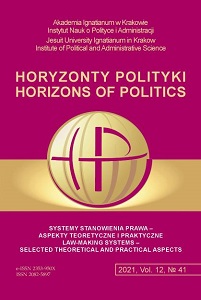Spór o granice wykładni definicji legalnych: podejścia formalistyczne i holistyczne
Dispute About Limitations in Interpreting Legal Definitions: Formalistic and Holistic Approaches
Author(s): Maurycy ZajęckiSubject(s): History of Law, Politics and law, Sociology of Law
Published by: Uniwersytet Ignatianum w Krakowie
Keywords: theory of law; legal definitions; interpretation of law; interpretative formalism; interpretative holism;
Summary/Abstract: RESEARCH OBJECTIVE: In the paper the author employs tools of analytical theory of law to propose a new criterion for putting barrier in interpreting legal definitions. This barrier is connected with logical structure of defining names (this structure is named in the paper “architecture of connotation”). THE RESEARCH PROBLEM AND SCIENTIFIC METHODS: The problem of interpreting legal definition is present in Polish literature in the field of theory of law. The mainstream approach is represented by Maciej Zieliński, who sees an unreachable limitation in interpreting legal definitions in their linguistic meaning (this approach assumes strong thesis of formalism in interpreting legal definitions). This approach has been criticized by Agnieszka Bielska-Brodziak (her approach assumes thesis of holism in interpreting legal definitions). The analysis of judiciary resolutions does not answer the question how Polish legal culture (ius interpretandi) resolves the controversy. THE PROCESS OF ARGUMENTATION: After presenting the above mentioned controversy in Polish jurisprudence, the notion of “architecture of connotation” is presented. This notion is used then to propose resolutions to several theoretical problems (conjunctions and alternatives in definitions, full and partial definitions, definitions sensu stricto and sensu largo). RESEARCH RESULTS: Weaker thesis of formalism in interpreting legal definitions is proposed and justified. After introducing the above mentioned notions, the author exemplifies them taking examples from Polish legal text. CONCLUSIONS, INNOVATIONS AND RECOMMENDATIONS: The approach is theoretical in nature, but conclusions of the paper might be of use for both interpreters of legal text (as a base for formulating interpretative directives), and legislators (as a base for creating analytical tools useful in the process of rational lawmaking). In closing remarks the author signals the need of continuing analysis in the domain of normative theories of legal interpretation by broadening and (if necessary) amending directives (principles, rules, and hints) of legal interpretation proposed by M. Zieliński and A. Choduń.
Journal: Horyzonty Polityki
- Issue Year: 12/2021
- Issue No: 41
- Page Range: 66-87
- Page Count: 23
- Language: Polish

